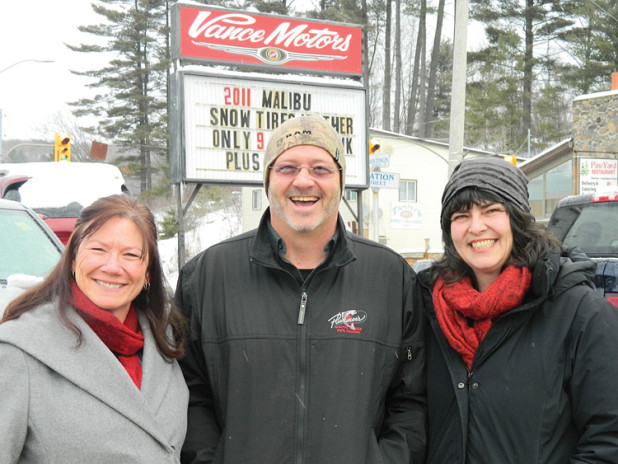Headline News
Small farming social enterprise proposed for North Hastings
January 28, 2016

Sherry Hayes, community volunteer; Kevin Vance, president of Vance Motors, and Jane Kali, North Hastings Community Trust – members of Highlands Harvest House proposed social enterprise for North Hastings. JIM EADIE Special to This Week
By Jim Eadie
Small greenhouses made out of surplus shipping containers? Known online as “freight farms” and “crop boxes” that will provide year round locally grown produce, as well as local employment, and also be sustainable, these could just possibly grow into a small local industry.
While researching green roof alternatives for his future new automobile dealership building, local businessman Kevin Vance bumped into the idea online. “Several American companies repurpose old shipping containers into year-round, four-season energy efficient greenhouses that can be relocated easily if necessary,” he said. “What a great idea for a rural northern community. Hook up to water and electricity … instant greenhouse!”
Further research by Vance found a northern Canadian project in Espanola that is successfully operating locally-designed small all-season greenhouses that support low cost sustainable agriculture throughout the cold northern winter there. That project is designed by Cambrian College’s applied research division. It is operated by and benefits Helios Whitefish River First Nation.
The idea cannot be that crazy. After connecting with Jane Kali at North Hastings Community Trust, and two community volunteers – Sherry Hayes and Hope McFall – the new community group pitched the idea and secured $3,000 from Community Futures Development Corp. (CFDC) in support of half the $6,000 cost needed to seriously investigate the project for this community, and prepare a feasibility study and a business plan.
“We need to do that first,” said Vance. “Before anything else happens, that must be done. If it is not economically sustainable, it’s not going to happen.”
The community group intends to establish a “social enterprise”: a sustainable business, but for community social gain. Social Enterprise Canada defines it as “a business owned by a non-profit organization with the blended purpose of generating income and achieving social, cultural and environmental aims.” Common examples of social enterprises include such things as a hospital auxiliary coffee shop, or a women’s shelter thrift store.
The new food-growing social enterprise being proposed has been named Highlands Harvest House.
“I am very passionate about growing food,” said Kali. “We need to find ways to sustain ourselves, we need to know what is in our food, and we need to grow more locally. We cannot continue to rely on industrial food packers.”
Kali, who has worked in the anti-poverty movement in various capacities for years, adds: “This project would help take steps to provide local employment.”
“It doesn’t make sense watching another tractor-trailer full of produce from California arrive at the grocery stores here, when we could grow it on our own,” said Vance. “We should be supplying local grocery stores and restaurants locally.”
And the dream doesn’t stop there. Vance notes that the study and plan will likely contain recommendations for greenhouses that fit best with our circumstances and weather conditions, and include the latest energy efficient knowledge. At some point in the project, he can envisage including a small consulting or shipping container retrofit business in North Hastings, possibly the first such business in Canada.
The first critically important step, according to Vance, is to have the feasibility study and business plan completed as soon as possible. “We are looking for community support, and investment,” he said. “We need to raise $3,000 to get moving on this. The best time to start catching fish is right now.”
This newest push for locally grown food and good jobs comes on the heels of a very successful community gardens program last summer. That project is planned to be even bigger this coming summer according to Kali, with the support of the Town of Bancroft.
“The way out of poverty is money,” she said. “We need opportunities for our youth, to keep our youth here. That means meaningful employment with good wages.”
“And this project will do two things,” said Vance. “Sustain local economic development, and reduce substantially our carbon footprint.”
For further information or to support this project, contact Kevin Vance 613-332-1410, or Jane Kali at North Hastings Community Trust 613-339-1100.

















